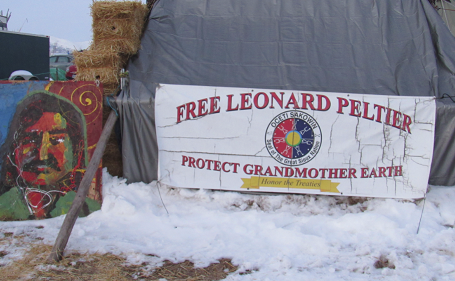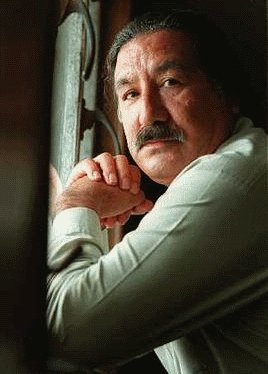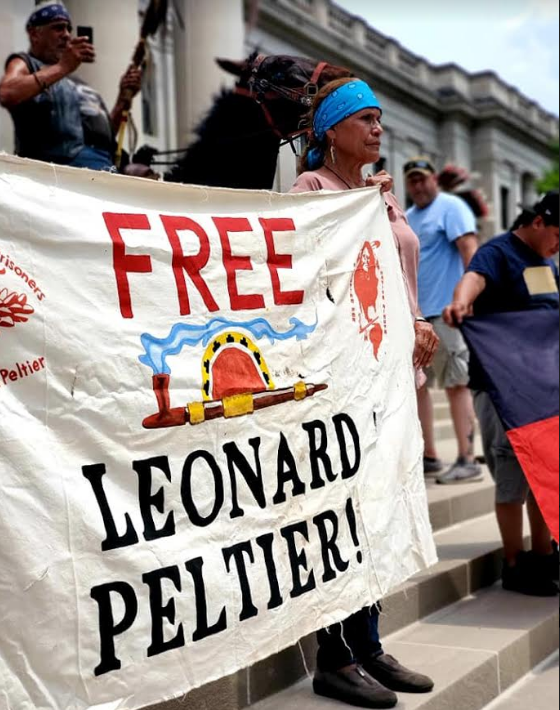Leonard Peltier is Coming Home!

Sumterville, FL – Today, President Biden granted Leonard Peltier executive clemency and commuted the remainder of his sentence. The president’s decision is the result of decades of grassroots organizing in Indian Country and the unveiling of increasing amounts of evidence of prosecutorial misconduct and constitutional violations during the prosecution of Peltier’s case.
“It’s finally over – I’m going home.” said Leonard Peltier. “I want to show the world I’m a good person with a good heart. I want to help the people, just like my grandmother taught me.”
“Leonard Peltier’s freedom today is the result of 50 years of intergenerational resistance, organizing, and advocacy,” said Nick Tilsen, NDN Collective Founder and CEO. “Leonard Peltier’s liberation is our liberation – we will honor him by bringing him back to his homelands to live out the rest of his days surrounded by loved ones, healing, and reconnecting with his land and culture.
“Let Leonard’s freedom be a reminder that the entire so-called United States is built on the stolen lands of Indigenous people – and that Indigenous people have successfully resisted every attempt to oppress, silence, and colonize us,” continued Tilsen. “The victory of freeing Leonard Peltier is a symbol of our collective strength – and our resistance will never stop.”
“Today’s decision shows the combined power of grassroots organizing and advocacy at the highest levels of government. We are grateful to President Biden and the leadership of Secretary Deb Haaland. said Holly Cook Macarro, Government Affairs for NDN Collective. “All of us here today stand on the shoulders of three generations of activists who have fought for justice for Leonard Peltier. Today is a monumental victory – the day that Leonard Peltier finally goes home.”
Please support the NDN Collective.
###
NDN Collective is an Indigenous-led organization dedicated to building Indigenous power. Through organizing, activism, philanthropy, grantmaking, capacity-building, and narrative change, we are creating sustainable solutions on Indigenous terms.
Leonard Peltier to Leave Prison After 50 Years as Biden Grants Commutation
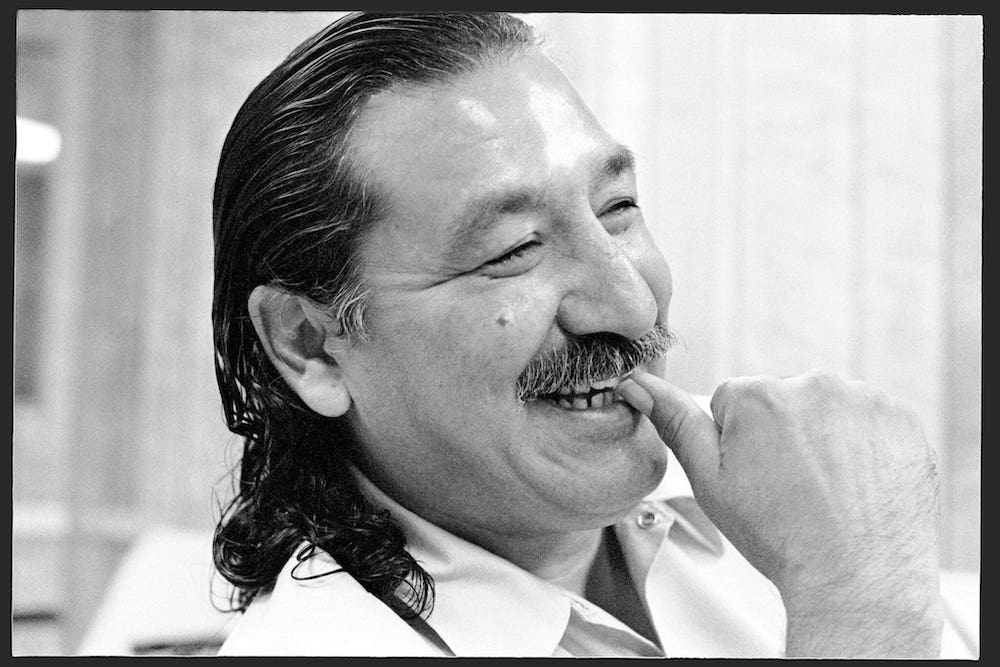
Leonard Peltier, 80, a member of the Turtle Mountain Band of Chippewa, will transition to home confinement after serving nearly 50 years of a life sentence.
- By Brian Edwards
NATIVE NEWS ONLINE
President Biden announced today he will commute Leonard Peltier's life sentence to home confinement, marking a major victory for tribal nations and advocates who have long fought for the Native American activist's release.
Peltier, 80, has spent nearly 50 years in federal prison after being convicted for the 1975 deaths of two FBI agents on the Pine Ridge Indian Reservation. He has maintained his innocence throughout his imprisonment.
A White House statement cited Peltier's advanced age, deteriorating health, and the extensive support for his release from tribal nations, Nobel Peace laureates, former law enforcement officials, and human rights organizations.
"This commutation will enable Mr. Peltier to spend his remaining days in home confinement but will not pardon him for his underlying crimes," according to the White House statement.
The decision comes after decades of campaigns by Native American leaders and organizations who have questioned the fairness of Peltier's trial and conviction. Even the former U.S. Attorney whose office handled Peltier's prosecution and appeal supported granting clemency.
The White House noted Peltier's "close ties to and leadership in the Native American community" as a factor in the decision.
The commutation of Peltier’s sentence comes after increased advocacy from tribal leaders, congressional members, human rights advocates and even former prosecutors who were involved in the case.
Last week, more than 120 tribal leaders, including National Congress of American Indians President Mark Macarro (Chairman of the Pechanga Band of Indians) and Navajo Nation President Buu Nygren, signed a letter urging Biden to grant clemency. In December, Macarro raised Peltier’s case directly with Biden during a flight on Air Force One, highlighting that Peltier was among the oldest surviving Indian boarding school survivors.
Peltier, an enrolled citizen of the Turtle Mountain Band of Chippewa Indians, spent three years at the Wahpeton Indian School in North Dakota as a child — a story he shared with Native News Online in 2022.
EXCLUSIVE: Leonard Peltier Shares His Indian Boarding School Story
In a post on X (formerly Twitter), outgoing Interior Secretary Deb Haaland (Laguna Pueblo) wrote: “I am beyond words about the commutation of Leonard Peltier. His release from prison signifies a measure of justice that has long evaded so many Native Americans for so many decades. I am grateful that Leonard can now go home to his family. I applaud President Biden for this action and understanding what this means to Indian Country.”
In her Tweet, she linked to the Biden administration’s release in White House press room, but the post had been removed during the presidential transition and was not included on the Biden White House archive.
Kevin Sharp, former Chief U.S. District Court judge and Peltier’s attorney, called Biden’s decision “an enormous step toward healing and reconciliation with the Native American people in this country.” Sharp, who filed Peltier’s original clemency petition in 2019, said Biden’s “act of mercy” will allow Peltier to return to his reservation and live out his remaining days.
The case has drawn international attention over the decades, with supporters like Nelson Mandela, Archbishop Desmond Tutu and Pope Francis advocating for Peltier’s release. Sharp represented Peltier for five years before NDN Collective took the lead on clemency efforts.
“Leonard Peltier’s freedom today is the result of 50 years of intergenerational resistance, organizing, and advocacy,” Nick Tilsen, NDN Collective Founder and CEO, said in a statement. “Leonard Peltier’s liberation is our liberation – we will honor him by bringing him back to his homelands to live out the rest of his days surrounded by loved ones, healing, and reconnecting with his land and culture.
“Today’s decision shows the combined power of grassroots organizing and advocacy at the highest levels of government. We are grateful to President Biden and the leadership of Secretary Deb Haaland,” Holly Cook Macarro, government affairs or NDN Collective, said. “All of us here today stand on the shoulders of three generations of activists who have fought for justice for Leonard Peltier. Today is a monumental victory – the day that Leonard Peltier finally goes home.”
Judith LeBlanc (Caddo), executive director of the Native Organizers Alliance released a statement as well, saying: “Our hearts are full for Leonard Peltier, his family, and all of Indian Country as he finally gets to go home after nearly 50 years behind bars. Leonard’s incarceration came to symbolize the injustices Native peoples face in defending our lands and civil and inherent rights. His resilience has stood as a testament to the enduring strength of Native peoples in the face of systemic racism and oppression.
U.S. Sen. Brian Schatz (D-Hawai‘i), vice chair of the Senate Committee on Indian Affairs, released the following statement: “If there were ever a case that merited compassionate release, Leonard Peltier’s was it,” said Schatz. “President Biden did the right thing by showing this aging man in poor health mercy and allowing him to return home to spend whatever days he has remaining with his loved ones. I thank President Biden and the countless advocates who’ve worked tirelessly over the years to secure Peltier’s release.”
Neely Bardwell provided reporting on this story.
Amnesty International noted there were “serious human rights concerns about the fairness” of Peltier’s trial.
By Chris Walker ,
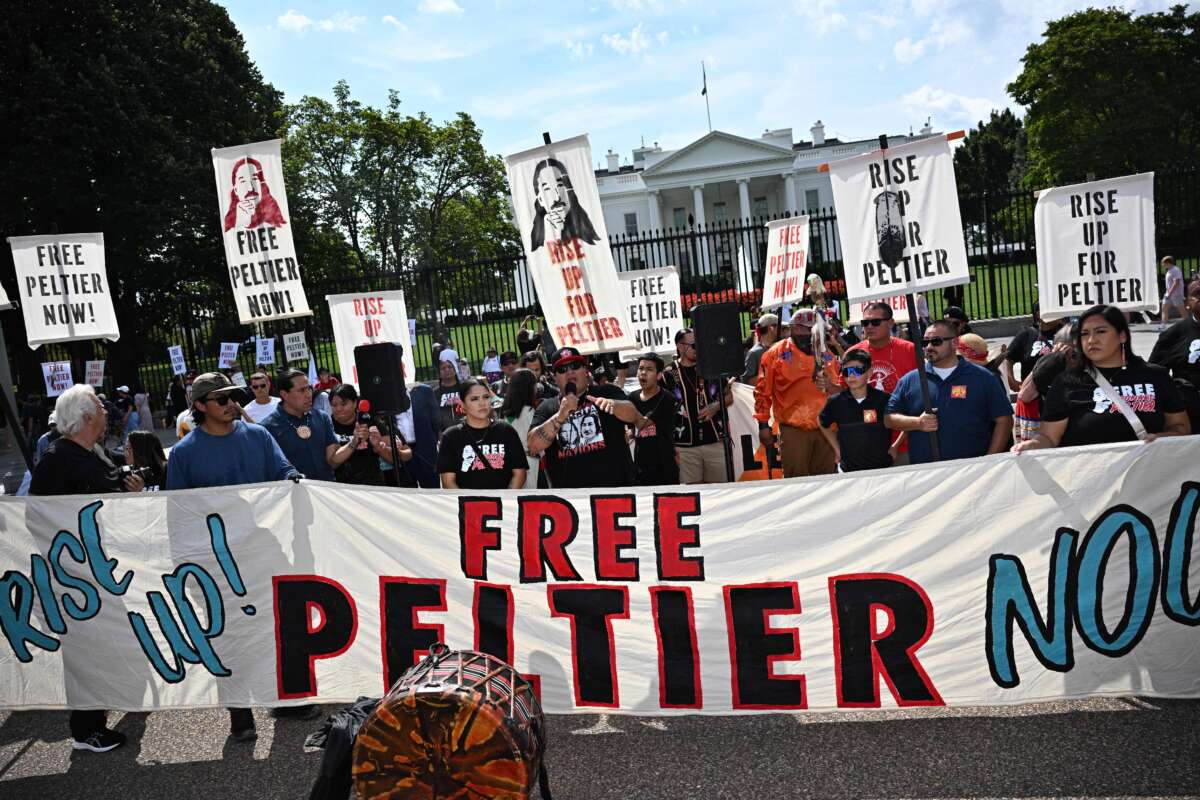
Moments before he left office and as one of his final acts as president, Joe Biden commuted the life sentence of Leonard Peltier, an 80-year-old Native American activist and political prisoner who has been incarcerated for nearly half a century for a crime he maintains he did not commit.
At the time of his conviction, Peltier was a member of the American Indian Movement, a grassroots movement that was founded in 1968 to advocate for Indigenous rights and sovereignty in the United States. He was charged under dubious circumstances for the killing of two FBI agents in a 1975 shootout at Pine Ridge Reservation in South Dakota. After being charged, he fled to Canada; he was extradited and sent back to the U.S. to face trial in 1977.
Indigenous advocates and human rights organizations have long maintained that Peltier was not given a fair trial. Evidence that could have exonerated him — including ballistics showing that the bullets that killed the two agents were not fired from Peltier’s weapon — was withheld from his lawyers. Testimony that led to the Canadian government agreeing to his extradition was also perjured.
In 2017, the former chief prosecutor who was part of the trial made an extraordinary request for then-President Barack Obama to grant Peltier clemency. That request was ultimately not granted. With Biden exiting the White House, several human rights organizations made those requests yet again, asserting that the unfair trial warranted a lessening of Peltier’s sentence.
Biden’s commutation is not a full pardon — Peltier will remain under house confinement, likely for the rest of his life. Still, human rights advocates and Indigenous activists who have campaigned for decades for Peltier to be granted clemency celebrated the action.
Related Story

Hours Away From Too Late: Demand Freedom for Leonard Peltier
We must join across movements and great distances to demand Obama make freeing Leonard Peltier part of his legacy. By Kelly Hayes , Truthout January 18, 2017
“President Biden was right to commute the life sentence of Indigenous elder and activist Leonard Peltier given the serious human rights concerns about the fairness of his trial,” said Paul O’Brien, executive director of Amnesty International USA.
“This is a huge win for grassroots Indigenous movements who kept his campaign alive and a moral indictment on the system and people who kept him unjustly imprisoned for half a century,” Indigenous organizer and journalist Nick Estes wrote in a post on X.
“Leonard Peltier’s liberation is our liberation – we will honor him by bringing him back to his homelands to live out the rest of his days surrounded by loved ones, healing, and reconnecting with his land and culture,” said NDN Collective founder and CEO Nick Tilsen. “Let Leonard’s freedom be a reminder that the entire so-called United States is built on the stolen lands of Indigenous people — and that Indigenous people have successfully resisted every attempt to oppress, silence, and colonize us.”
Peltier also celebrated his commutation.
“It’s finally over — I’m going home,” he said, adding that he planned to do acts of good work following his release.
“I want to show the world I’m a good person with a good heart. I want to help the people, just like my grandmother taught me,” Peltier said.
"The victory of freeing Leonard Peltier is a symbol of our collective strength—and our resistance will never stop," vowed one Indigenous organizer.
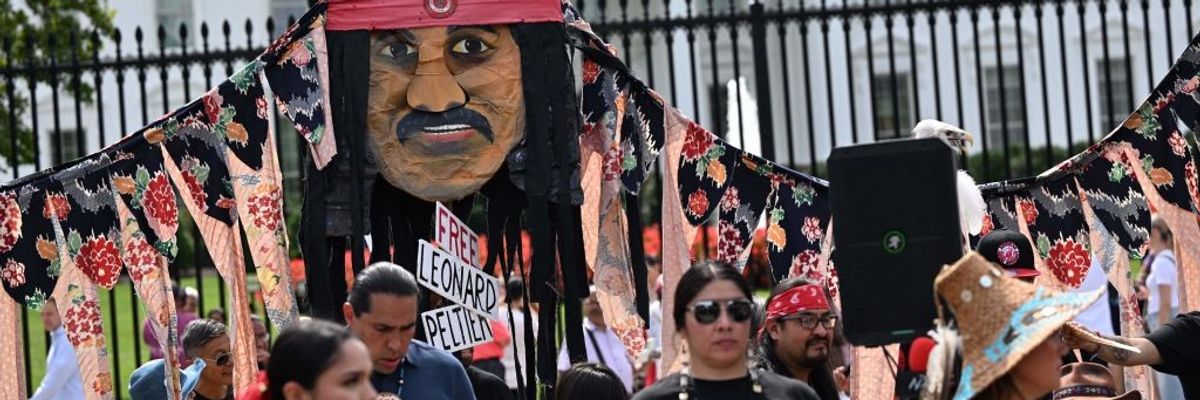
Indigenous rights defenders rally in support of imprisoned Native American activist Leonard Peltier at Lafayette Square across from the White House in Washington, D.C. on September 12, 2023.
(Photo: Mandel Ngan/AFP via Getty Images)
Brett Wilkins
Jan 20, 2025
COMMON DREAMS
Just minutes before leaving office, Joe Biden on Monday commuted the life prison sentence of Leonard Peltier, the elderly American Indian Movement activist who supporters say was framed for the murder of two federal agents during a 1975 reservation shootout.
"It's finally over, I'm going home," Peltier, who is 80 years old, said in a statement released by the Indigenous-led activist group NDN Collective. "I want to show the world I'm a good person with a good heart. I want to help the people, just like my grandmother taught me."
While not the full pardon for which he and his defenders have long fought, the outgoing Democratic president's commutation will allow Peltier—who has been imprisoned for nearly a half-century—to "spend his remaining days in home confinement," according to Biden's statement, which was no longer posted on the White House website after Republican President Donald Trump took office Monday afternoon.
"Tribal Nations, Nobel Peace laureates, former law enforcement officials (including the former U.S. attorney whose office oversaw Mr. Peltier's prosecution and appeal), dozens of lawmakers, and human rights organizations strongly support granting Mr. Peltier clemency, citing his advanced age, illnesses, his close ties to and leadership in the Native American community, and the substantial length of time he has already spent in prison," Biden explained.
Biden Interior Secretary Deb Haaland, the first Indigenous cabinet secretary in U.S. history, said in a statement: "I am beyond words about the commutation of Leonard Peltier. His release from prison signifies a measure of justice that has long evaded so many Native Americans for so many decades. I am grateful that Leonard can now go home to his family. I applaud President Biden for this action and understanding what this means to Indian Country."
Congressman Raúl Grijalva (D-Ariz.), who last month led 34 U.S. lawmakers in a letter urging clemency for Peltier, said in a statement that "for too long, Mr. Peltier has been denied both justice and the pursuit of a full, healthy life at the hands of the U.S. government, but today, he is finally able to go home."
"President Biden's decision is not just the right, merciful, and decent one—it is a testament to Mr. Peltier's resilience and the unwavering support of the countless global leaders, Indigenous voices, civil rights and legal experts, and so many others who have advocated so tirelessly for his release," Grijalva added. "While there is still much work to be done to fix the system that allowed this wrong and so many others against Indian Country, especially as we face the coming years, let us today celebrate Mr. Peltier's return home."
NDN Collective founder and CEO Nick Tilsen said Monday that "Leonard Peltier's freedom today is the result of 50 years of intergenerational resistance, organizing, and advocacy."
"Leonard Peltier's liberation is our liberation—we will honor him by bringing him back to his homelands to live out the rest of his days surrounded by loved ones, healing, and reconnecting with his land and culture," Tilsen continued.
"Let Leonard's freedom be a reminder that the entire so-called United States is built on the stolen lands of Indigenous people—and that Indigenous people have successfully resisted every attempt to oppress, silence, and colonize us," Tilsen added. "The victory of freeing Leonard Peltier is a symbol of our collective strength—and our resistance will never stop."
Amnesty International USA executive director Paul O'Brien said that "President Biden was right to commute the life sentence of Indigenous elder and activist Leonard Peltier given the serious human rights concerns about the fairness of his trial."
While Peltier admits to having participated in the June 26, 1975 gunfight at the Oglala Sioux Reservation at Pine Ridge, South Dakota, he denies killing Federal Bureau of Investigation agents Jack Coler and Ronald Williams.
As HuffPost senior political reporter Jennifer Bendery recapped Monday:
There was never evidence that Peltier committed a crime, and the U.S. government never did figure out who shot those agents. But federal officials needed someone to take the fall. The FBI had just lost two agents, and Peltier's co-defendants were all acquitted based on self-defense. So, Peltier became their guy.
His trial was rife with misconduct. The FBI threatened and coerced witnesses into lying. Federal prosecutors hid evidence that exonerated Peltier. A juror acknowledged on the second day of the trial that she had "prejudice against Indians," but she was kept on anyway.
The government's case fell apart after these revelations, so it simply revised its charges against Peltier to "aiding and abetting" whoever did kill the agents—based entirely on the fact that he was one of dozens of people present when the shootout took place. Peltier was convicted and sentenced to two consecutive life terms.
American Indian Movement (AIM) activist Joe Stuntz Killsright was also killed at Pine Ridge when a U.S. Bureau of Indian Affairs agent sniper shot him in the head after Coler and Williams were killed. Stuntz' death has never been investigated.
Some Indigenous activists welcomed Peltier's commutation while also remembering Annie Mae Pictou Aquash, an Mi'kmaq activist who was kidnapped and murdered at Pine Ridge in December 1975 by her fellow AIM members. Some of Aquash's defenders believe her killing to be an assassination ordered by AIM leaders who feared she was an FBI informant.
Before leaving office, Biden issued a flurry of eleventh-hour preemptive pardons meant to protect numerous relatives and government officials whom Trump and his allies have threatened with politically motivated legal action.
However, the outgoing president dashed the hopes of figures including Steven Donziger, Charles Littlejohn, and descendants of Ethel Rosenberg, who were seeking last-minute pardons or commutations.






